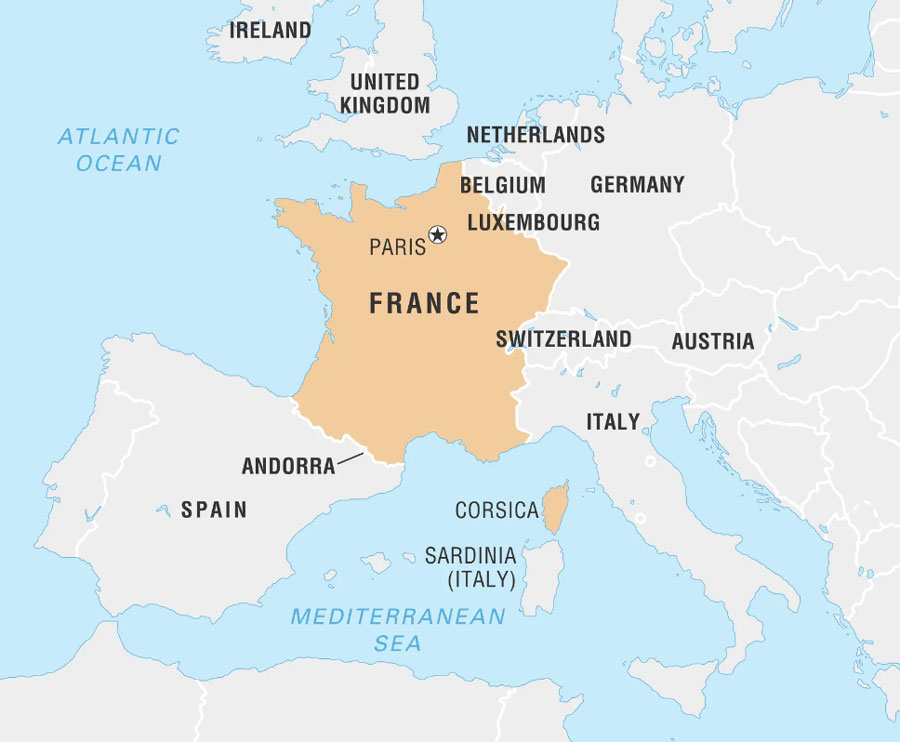
Five Quick Points About France
- The world’s 7th largest study destination for foreign students
- Incredible diversity of higher education institutions as well as programmes – something for everyone
- High-quality, well-recognised degrees
- Amazingly rich, historic, and vibrant culture – a main reason France is among the top three global tourist destinations
- Many French institutions have added international elements to their courses, including a wide variety of programmes that are taught in English
Location and Geography

France is the largest nation in Western Europe, with a total area of 674,843 square kilometres. It is surrounded by Belgium and Luxembourg, Spain, Germany, Switzerland, Italy, and by water bodies the Bay of Biscay, the English Channel, and the Mediterranean.
France is a land of flat plains or gently rolling hills in the north and west, forests and mountainous areas in the Pyrénées (south), Alps (east), and lower Vosges mountains (northeast). The capital city is Paris.
Climate
Mainland France has cool winters and mild summers, with the occasional Mistral wind. The Mediterranean coast has mild winters and hot summers.
History and Population
In 2,500 BC, the Celts settled in Gaul (France) and dominated until absorbed by the Roman Empire after 125 BC. By the 17th century, France was the dominant power in Europe under Louis XIV. The 18th and 19th centuries saw the French Revolution and Napoleonic Empire, the Franco-Prussian War, and beginning of the Third Republic. In the 20th century, France was occupied in both World Wars, which is perhaps a contributing factor in its modern foreign policy, which has seen it as a strong supporter of efforts against genocides (e.g., in the Balkans) and international terrorism. The Fourth Republic was established in 1946, and the Fifth Republic in 1958.
The current population is around 68 million with a median age of 40 years. Nearly 9% of France’s population is composed of immigrants. The largest immigrant groups are the Portuguese, Algerians, Moroccans, Spanish, Italians, and Tunisians. Overall population density is relatively low for Europe. More than three-quarters of French residents live in urban areas. French is the official language.
Society and Culture
France and particularly Paris have been key centres in European cultural development, including philosophy, arts, architecture, design, fashion, music, cuisine, wine, and filmmaking. A tradition of independent thinking has helped to fuel significant periods of internal social unrest. French beliefs and values hold that quality of life is of the essence and that work, a home, and education are essential rights.
Food and drink play a major role in French culture, with fresh produce, fine meats, cheese, and wine the mainstays of the family table and a source of pride internationally. Meals are generally slow, often with several courses, and accompanied by conversation.
The urban areas of France contain a diverse multicultural society. Football, tennis, skiing, and equestrianism are popular sports. Boules games are a traditional marketplace social activity in regional villages.
Economy
France’s economy is the sixth-largest in the world and France is a member of the G8 and G20 groups of leading industrialised countries. It is overall a free market economy; still, the government continues to play a significant role in some areas, particularly with regard to infrastructural industries. It has a mixed industrial and agricultural export-oriented economy and is also prioritising its knowledge economy. France has an international reputation for excellence in the fields of space, transportation, sciences, biotechnology, health, and electronics, which many people attribute to its excellent higher education system.
The currency is the Euro.
Government
The Fifth French Republic has a semi-presidential style of government with a dual executive: the president and the prime minister. The French parliament consists of the National Assembly (five-year term) and the Senate (nine-year term). The Executive (Council of Ministers) is appointed by the prime minister at the suggestion of the president.
France has three levels of local government: 22 Régions plus four Régions d’outre-mer; 96 Départements plus four Départements d’outre-mer and 36,679 municipalities (Communes).
The French government is highly invested in its higher education system. It subsidises a large share of the cost of higher education for students, allowing as many students as possible to achieve post-secondary education by making it more affordable.
Living Conditions and Cost of Living
Students can live reasonably well on around €1,000 a month (other than Paris, which is more like €1,200–€1,800), depending on location and lifestyle. Tuition fees vary considerably from €190–€620 per year at public universities and from €1,500 to €20,000 a year at private universities. The average cost of health insurance is around €40–€50 per month.
Education System
France spends more per capita on education than many other Western countries and has traditionally had high academic standards.
There are more than 400 institutions of higher education and research in four different types: universitaires (universities); grandes écoles; écoles spécialisées, and sections de techniciens supérieurs. Grandes écoles and écoles spécialisées or supérieurs are considered to offer higher quality learning environments than the universitaires.
France’s 83 public universitaires offer degree programmes in all disciplines and are spread throughout the country. There are three levels of degree: licence (three years), master’s (five years) and doctorate (eight years). Degrees can be academic, technical, or professional. To be considered for admission, international students need to demonstrate they have the credentials that would allow them to undertake higher education in their home countries.
Grandes écoles can be public or private, and they are a unique French invention. They are very selective in their admissions, much more so than the universitaires, and most specialise in business and engineering programmes. Others have reputations for public administration, teaching and research, veterinary medicine, and military sciences, to name a few. The grandes écoles have admission procedures and guidelines for international students as well as for French students.
Prospective international students must contact individual institutions directly for admission information and requirements for studying in France. Most programmes are taught in French, although more higher education institutions are now offering courses in English. Entry requires appropriate French-language proficiency. Some students may need to sit a French language test or undertake a French-language course. Enrolments should be made no later than September.
Information Specific to International Students
France had 365,000 international students studying in its higher education system in 2021, making it the world’s seventh most popular study destination. The French higher education system is very accessible to international students; please see this link for France’s welcoming policies regarding foreign students.
Prospective international students should check current visa requirements at the French embassy or consulate in their home country: https://www.campusfrance.org/en/the-different-types-of-visas
Regarding work allowances for international students, Campus France reports:
“All international students have the right to work while studying in France as long as they are registered in an institution that participates in the national student health-care plan (and they have a resident permit if not an EU national). The right to work applies to all students, including students who come to France for the first time, registered in the first year of a university program, or registered full-time in a language school.”
Read more: https://www.campusfrance.org/en/working-student
More Information
Campus France: https://www.campusfrance.org/en
More Useful Resources
www.diplomatie.gouv.fr – Ministry of Foreign and European Affairs
www.education.gouv.fr – Ministère de L’éducation Nationale : Information on the French education
system
www.vosdroits.service-public.fr – DDTEFP – La Direction Départementale du Travail, de L’emploi et
de la Formation Professionnelle: Assesses and issues work permits, info on social security
www.oecd.org – Organisation for Economic Co-operation and Development (OECD)
www.europa.eu – the European Union (EU)
www.eubusiness.com/France/econ – EU Business site: Information on French economy
www.imf.org – International Monetary Fund (IMF) reports on French economy
www.ceftunisie.org – A commercial portal for tertiary/higher education in France and careers
www.intstudy.com/visafran.htm – The International Education Site: Information on student visas
www.francetourism.com – French Tourist Office for Travel and Tourism
www.justlanded.com – Just Landed – Living Abroad website: Useful information, services and links
www.discover france .net – Commercial site for a range of tourist information on France
www.france-voyage.com – Commercial site with easy access to information on every region in France

